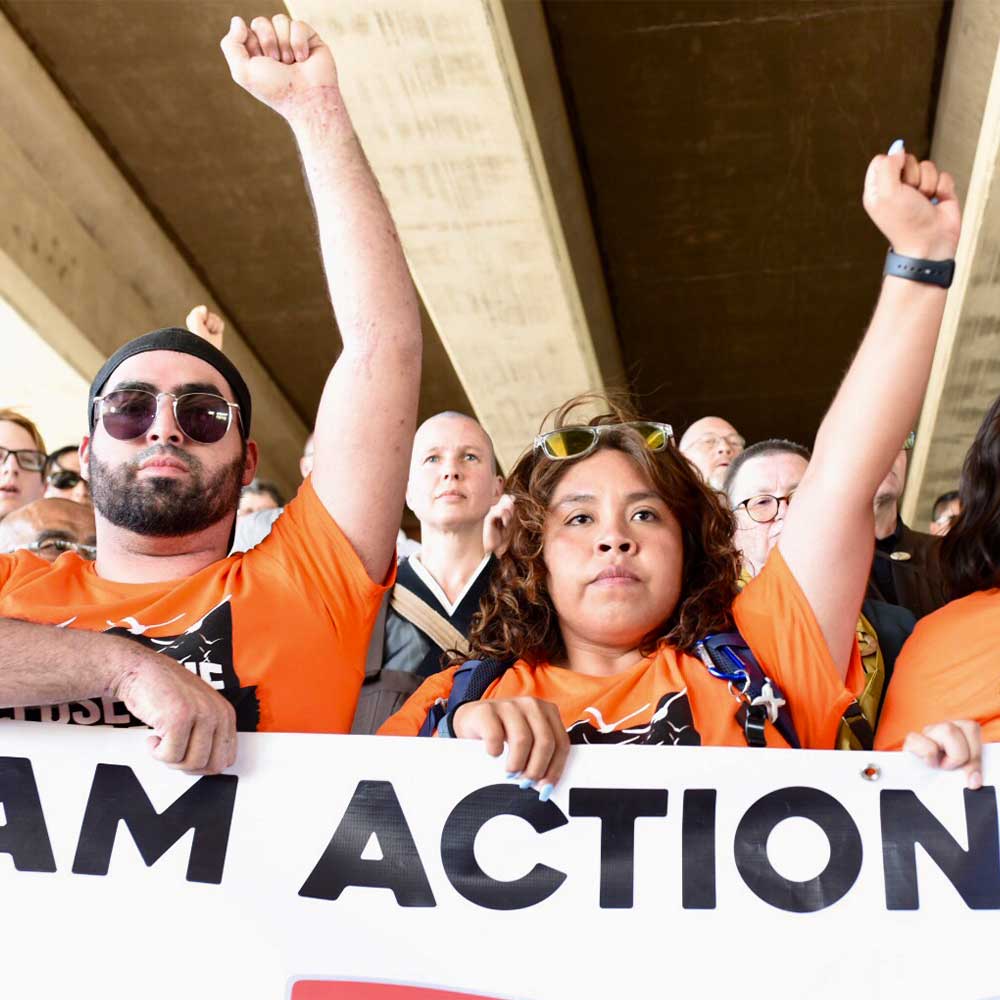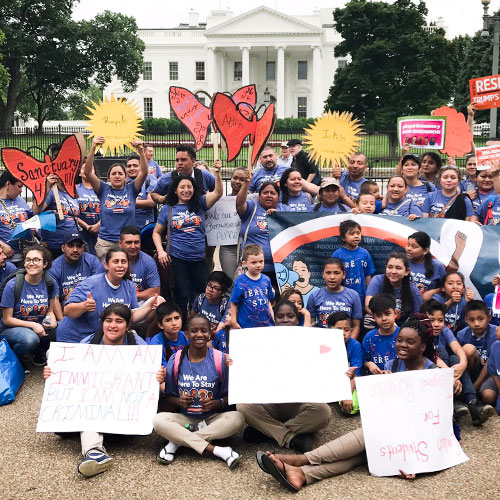Washington, DC — Today the Defund Hate Coalition, led by immigrant communities, faith leaders, and civil and immigrant rights advocates, released a new transformative budget proposal for U.S. immigration, centered on creating a path for a just and compassionate approach that welcomes, respects, and honors the human rights and dignity of all immigrants.
Year after year, the federal government has approved massive funding increases for Immigration and Customs Enforcement (ICE) and Customs and Border Protection (CBP), the agencies at the helm of the U.S. immigration system’s efforts to target, jail and deport immigrants. Taxpayer money is fueling a punitive immigration system that has separated thousands of loved ones, caused hundreds of deaths, and wreaked destruction at U.S. borders, all while siphoning resources away from real community needs.
The Defund Hate Coalition’s transformative budget proposal presents “Beyond the Enforcement Paradigm,” highlighting the fundamental shifts needed to eradicate the U.S. ‘s reliance on law enforcement to respond to migration, and demonstrating the impact of immigration enforcement funding through the stories and requests of people in communities. The coalition lays out a vision for reprioritizing resources, beginning with defunding ICE and CBP and instead investing in vital programs and services that respond to real need, including affordable housing, community healthcare and environmental protections.
A snapshot of recommendations detailed in the transformative budget, include:
- Divesting from ICE’s Enforcement and Removal Operations – In recent years, ICE has received more than $4 billion annually to target, detain, and deport immigrants. In 2019, the agency reached historic numbers, detaining over 500,000 immigrants throughout the year and deporting more than half of them. Ripping people from their homes and forcing them to go through proceedings from behind bars is traumatizing and undermines their ability to fight their case.
- Investing in Voluntary Community-Based Resettlement Services – This should include but not be limited to employment services including job training and job search assistance, transitional and long-term housing assistance, full access to medical/mental health services, language and cultural training, and transportation. Services should be easily accessible to all non-citizens, but never mandatory or used as a vehicle to track or surveil individuals.
- Divesting from CBP’s Border Patrol – The Border Patrol is an abusive, unaccountable force that has inflicted terror and suffering on border communities and immigrants alike, particularly against people of color. Units of armed Border Patrol agents profile and harass the region’s residents, while contributing to incalculable loss of life for migrants on both sides of the border. Over the past four years, the Border Patrol’s budget has surged by nearly $1 billion, entrenching the concentrated militarization of the border region.
- Investing in Rights-respecting Border Management – Our border regions have long been treated as zones of exception for human rights. Instead our border policies and practices should reflect human rights standards while prioritizing access to protections for all, regardless of immigration status. This means facilitating safe and accessible means for people to seek legal protection in the U.S. and ensuring humane, efficient, and timely processes to welcome newcomers and border residents alike without detention.
On the release of the Transformative Budget Proposal, advocates from the Defund Hate Coalition said:
Gabriela Viera, Advocacy Manager at Detention Watch Network, said:
“ICE and CBP are agencies founded on racist, dehumanizing laws that allow our government to criminalize immigrants, militarize the border region, incarcerate and deport millions of people, and further marginalize and profile people of color. Divesting from ICE and CBP is part of divesting from the U.S.’ militarized budget, from our policing system and prison industrial complex, and from the institutions that most heavily harm Black, brown, indigenous, and poor communities in this country and all over the world. Investing in public services that support everyone’s ability to live whole and secure lives is part of repairing this harm and building strength among us all.”
Cynthia Garcia, National Campaigns Manager for Community Protection at United We Dream, said:
“The government is responsible for ensuring that everyone is treated with dignity and respect, yet since ICE and CBP were created in 2003, they’ve collectively received nearly $300 billion of taxpayer money while continuing to inflict harm on people fleeing violence or seeking a better life, as well as on immigrants who have lived in the U.S. for decades. Our proposed budget illustrates how we can move towards a more just and humane immigration system by reprioritizing funding and investing it in community-based resources that help our communities.
At a time when public services are most desperately needed in the face of a global pandemic, Congress has not changed course and continues to pour billions into immigration enforcement. These critical resources could be better used for the causes championed by our allies in the movements for affordable housing, healthcare, education, and other vital programs that benefit everyone. Our transformative budget shows that we have the resources to take care of people and create an environment that treats everyone with the humanity they deserve. Now it’s time to act.”
Lorah Steichen, Outreach Coordinator for the National Priorities Project at the Institute for Policy Studies, said:
“The federal budget should be a moral document that reflects our values as a country. Amid all the ongoing crises we face, it’s clearer than ever that our militarized budget priorities are dangerously out of whack. It’s time to stop writing a blank check to agencies that perpetuate harm, misuse taxpayer dollars, and undermine our values. We must reclaim our resources and build an immigration system that repairs decades of destructive policies at home and abroad, treats every person with dignity and respect, and invests our resources into the collective health and well-being of all people. We must begin passing transformative budgets that defund hate.”
Patrice Lawerence, Co-Director at UndocuBlack Network, said:
“The U.S. immigration system’s cruel mistreatment of migrants at the border and in the interior of the country is not due to a lack of resources. The disparate treatment of Black migrants in particular is a matter of choice and priority, rather than a need for more funding. The Defund Hate Campaign’s transformative budget is a blueprint for the Biden-Harris Administration on how to divest from funds that support the cruelty of ICE/CBP and instead invest in programs and projects that seek to protect us and help us live our fullest lives. Our plan allows the opportunity to deliver medical care and social services rather than uphold deals with private prison companies; and to provide rapid processing and placements for asylum seekers with their loved ones in the United States rather than uphold contracts with Amazon and private companies for surveillance and deportation planes. So far, the Biden-Harris Administration has chosen to invest in cages, rather than care, receiving a failing grade from the UndocuBlack Network, but it is not too late to change that.”
Vicki B. Gaubeca, director of the Southern Border Communities Coalition, said:
“It is unconscionable that the current administration continues to inflate the budgets of ICE and CBP, organizations that don’t keep us safer, but instead create fear, distrust and harm the most vulnerable people in our communities. The southern border region has suffered under decades of militarization through deadly wall and unaccountable border agents. Defund Hate’s transformative budget is an opportunity to rethink our borders by divesting from ICE and CBP, and investing in infrastructure and organizations that will welcome all people to our borders in a humane and equitable manner, and connect them to the resources they need efficiently and safely. The transformative budget presents a new vision of border governance, one that moves away from funding abusive militarization, and towards funding things that borderlanders need — affordable housing, community healthcare and environmental protections.”
Oscar Chacon, Executive Director, Alianza Americas said:
“The U.S. immigration enforcement system is fatally flawed. The just solution is to wholly divest from this enforcement-centered approach and instead prioritize resources for community services that provide meaningful support to immigrants as they navigate their proceedings and repair the harms caused by the current system. These care services should be viewed as an investment in whole communities because our communities are stronger when all people have access to resources to build safe and healthy lives.”






